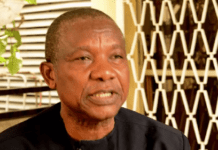-Says 1 in 4 Persons with HIV Don’t Know their Status
As Nigerians join the rest of the world to commemorate the World AIDS Day, usually celebrated on the first day of December of every year, the World Health Organisation (WHO) has recommended the use of self-tests for HIV, in order to bridge gaps in the availability of HIV tests.
This year’s celebration themed “Know your status”, marks the 30th anniversary of World AIDS Day – a pioneering global health campaign first initiated by WHO in 1988.

WHO, through a statement released for the 2018 commemoration of the day, noted that the institution first recommended HIV self-testing in 2016, and now more than 50 countries have developed policies on self-testing.
Meanwhile, available statistics shows that Nigeria has the second largest HIV epidemic in the world. Although HIV prevalence among adults is much less (2.8%) than other sub-Saharan African countries such as South Africa(18.8%) and Zambia (11.5%), the size of Nigeria's population means 3.1 million people were living with HIV in 2017.
While stressing that one in four persons with HIV do not know they have the disease, the document stated that people with HIV often have other infections – known as co-morbidities – such as TB or hepatitis. One in three deaths in people with HIV is from TB. Around 5 million people are living with both HIV and viral hepatitis. One in three people with HIV has heart disease.
“This has meant that HIV care has long needed joined-up care, although this doesn’t always happen in practice. WHO is now promoting ‘person-centred’ health services to all people living with HIV, to meet their holistic health needs, not just their HIV infection – linking HIV services with those for TB, sexual and reproductive health, non-communicable diseases and mental health,” says Dr Hirnschall.
To achieve this goal, the release explained that outside sub Saharan African, 75% of new infections are among key populations and their partners. Thus these data need to be acted upon and services to be re-focused to reach these populations at greatest risk. This will include addressing stigma and discrimination that continue to be barriers and providing services in and with communities.
“In 2016 the World Health Assembly adopted the WHO Global Health Sector Strategy on HIV, 2016-2021. The strategy provides new direction for the HIV response as it aims to fully integrate HIV into the broader health and development agenda of achieving universal health coverage by 2030 – where all people receive high-quality health services and medicines they need without experiencing financial hardship.
“The future of the HIV response will also require looking beyond HIV care provision and ensuring that the disease response is embedded in universal health coverage. Ending AIDS is unlikely to ever happen without Integrated health system that provide HIV prevention, diagnosis, and treatment as well as care with other essential health services. and support to other co-morbidities such as TB, NCDs and mental health at the community level. A people-centred, human rights based and holistic approach is crucial”, says Dr Naoko Yamamoto, Assistant Director-General for Universal Health Coverage and Health Systems, WHO.
The apex health institution has also assured of it continuous efforts in working with international organizations such as Unitaid and others, and its continued support to the largest HIV self-testing programmes in six countries in southern Africa. This programme is reaching people who have not tested themselves before, and is linking them to either treatment or prevention services. This World AIDS Day, WHO and the International Labour Organization will also announce new guidance to support companies and organizations to offer HIV self-tests in workplace.
Fear, stigma and ignorance. That is what defined the HIV epidemic that raged through the world in the 1980s, killing thousands of people who may only have had a few weeks or months from diagnosis to death – if they even managed to be diagnosed before they died.
“With no effective treatment available in the 1980s, there was little hope for those diagnosed with HIV, facing debilitating illness and certain death within years,” says Dr Gottfried Hirnschall, Director of the HIV department at WHO.
1 December 2018 marks the 30th anniversary of World AIDS Day – a day created to raise awareness about HIV and the resulting AIDS epidemics. Since the beginning of the epidemic, more than 70 million people have acquired the infection, and about 35 million people have died. Today, around 37 million worldwide live with HIV, of whom 22 million are on treatment













